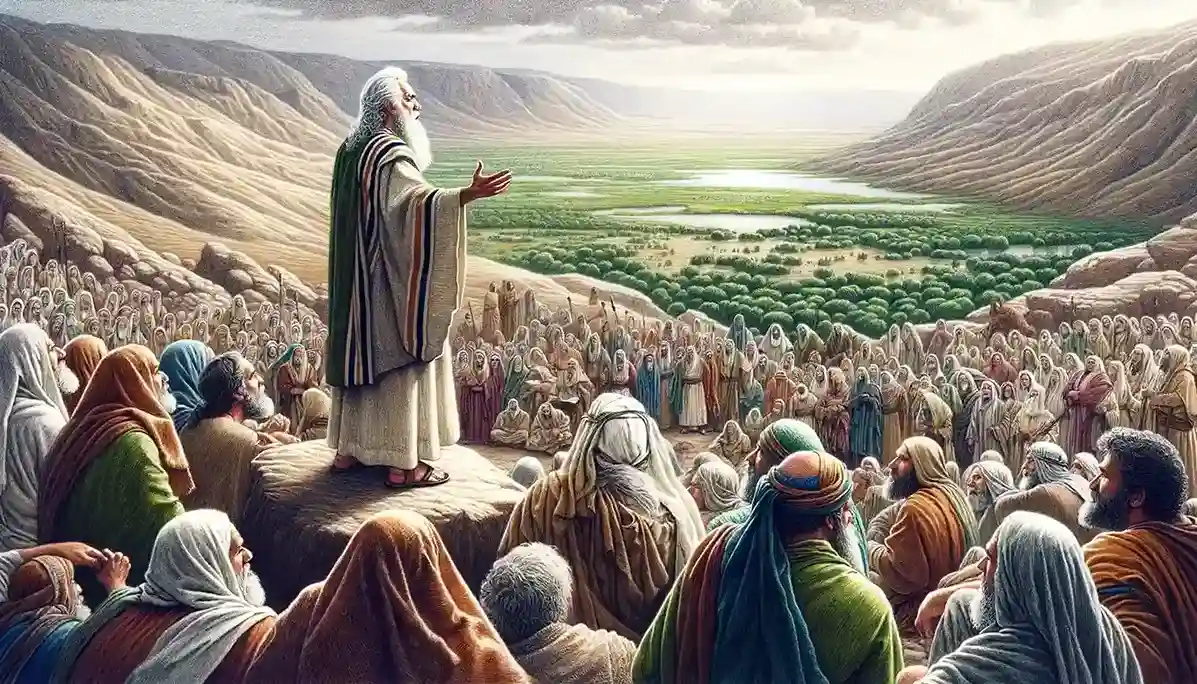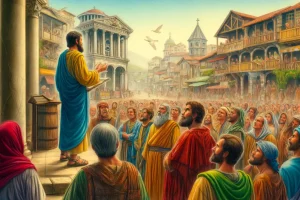
The Book of Deuteronomy
The Book of Deuteronomy is the fifth and final book of the Torah in the Hebrew Bible and the Old Testament. Here are some concise key facts about this important biblical text:
- Title and Position: The name “Deuteronomy” comes from the Greek words “deuteros” (second) and “nomos” (law), meaning “second law.” It refers to the book’s nature as a repetition and explanation of the law given to the Israelites. In Hebrew, it is called “Devarim,” meaning “words” or “things,” derived from the opening phrase.
- Authorship and Date: Traditionally attributed to Moses, Deuteronomy is believed to have been composed in the 7th century BC, with scholars arguing that it was a product of the Josianic reforms.
- Structure and Content: Deuteronomy is structured as a series of speeches delivered by Moses to the Israelites on the plains of Moab just before entering the Promised Land. It revisits laws given in previous books and introduces new laws. The book can be divided into three parts:
- Historical Review (Chapters 1-4): Moses reviews the journey from Egypt to Moab, emphasizing God’s guidance and the reasons for the 40-year wilderness wandering.
- The Deuteronomic Code (Chapters 5-26): A detailed code of laws that the Israelites are to follow in the land of Canaan, covering topics from worship and festivals to civil and criminal law.
- Final Discourses and Death of Moses (Chapters 27-34): This section includes blessings, curses, and the final blessings of Moses upon the tribes, followed by the account of Moses’ death.
- Main Themes:
- Covenant and Law: Emphasizes the covenant between God and Israel, urging obedience to God’s commandments as a condition of their prosperity in the Promised Land.
- God’s Justice and Mercy: Showcases God’s nature as just and merciful, forgiving Israel’s sins when they repent, yet just in administering consequences for disobedience.
- Leadership Transition: Prepares for the transition of leadership from Moses to Joshua, marking a critical phase in Israel’s history.
- Theological Significance:
- Deuteronomy’s focus on monotheism, the centralization of worship, and social justice has profoundly influenced Jewish thought and Christian ethics.
- It reinforces the importance of choice in obeying God’s law and the blessings associated with obedience.
- Modern Relevance: Deuteronomy resonates today with its emphases on social justice, ethical behavior, and the choice between life and death, blessing and curse, encouraging a life aligned with divine will and community welfare.
The Book of Deuteronomy, the final book of the Torah, is a profound theological document that serves both as a recapitulation of the Mosaic Law and as a call to faithfulness for the Israelite community. It is structured as a series of farewell addresses by Moses to the people of Israel, poised on the brink of entering the Promised Land. Below is a detailed analysis of Deuteronomy, exploring its structure, content, major themes, and theological implications:
Structure and Content
1. Introduction and Historical Review (Chapters 1-4):
- Recap of the Journey: Moses recounts the history of the Israelites from Horeb (Sinai) to their current location in Moab, highlighting critical events and lessons learned during the journey.
- Exhortations to Obedience: Moses urges the people to obey God’s laws faithfully, using their past failures as warnings against future disobedience.
2. The Deuteronomic Code (Chapters 5-26):
- Restatement of the Ten Commandments (Chapter 5): Moses reiterates the core of Israel’s legal and moral obligations.
- Laws and Statutes: This extensive section covers civil, criminal, and religious laws, including rules for kings, the rights of individuals, rules for warfare, and the importance of justice and equity.
- Specific Laws: Regulations regarding worship, the central sanctuary, prophets, cities of refuge, and various other societal functions emphasize a society built on justice, compassion, and the exclusive worship of Yahweh.
3. Covenants and Final Discourses (Chapters 27-34):
- Ratification of the Covenant (Chapters 27-28): A ceremony is described where blessings and curses are pronounced, reinforcing the covenantal relationship.
- Renewal of the Covenant (Chapters 29-30): Moses calls for a renewal of the covenant, urging the people to choose life by loving and obeying God.
- Succession of Joshua (Chapter 31): Moses prepares Joshua to lead Israel and commissions him in the presence of the people, ensuring the continuity of leadership.
- Moses’ Final Blessing and Death (Chapters 33-34): Moses blesses the tribes of Israel and views the Promised Land from Mount Nebo before his death.
Major Themes
1. Covenant and Obedience:
- Deuteronomy emphasizes the covenantal relationship between God and Israel, where blessings are contingent upon the people’s obedience to the law. The covenant is central, framing the legal and moral directives as part of Israel’s special relationship with God.
2. The Love and Justice of God:
- The book highlights God’s love for His people and His demand for social justice, which includes care for the weak and marginalized, such as widows, orphans, and foreigners.
3. The Shema and Monotheism:
- Deuteronomy 6:4-5 contains the Shema, a foundational text in Jewish religious life, emphasizing the oneness of God and the total devotion required from His followers.
4. Memory and Identity:
- By recalling past experiences and laws, Deuteronomy serves to solidify Israel’s identity as God’s chosen people and to instill a collective memory that will guide their future actions and decisions.
Theological Significance
Deuteronomy serves as a theological bridge between the Mosaic covenant and the future challenges Israel will face in Canaan. It reiterates the law not merely as legal code but as a way of life that embodies justice, mercy, and holiness. The repeated call to choose life through obedience and covenant fidelity underscores the book’s urgent message about the consequences of Israel’s choices.
Conclusion
The Book of Deuteronomy stands out for its depth of legal, moral, and spiritual instruction. It calls on Israel to remember their past, live obediently in the present, and embrace a future marked by faithfulness to God. This message resonates not only in Jewish tradition but also in Christian thought, where it continues to influence ethical discussions and spiritual reflections.



